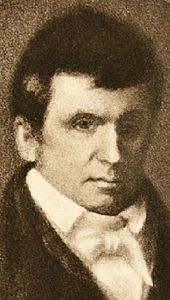Horace Everett
Horace Everett (born July 17, 1779 in Foxboro , Massachusetts , † January 30, 1851 in Windsor , Vermont ) was an American politician . Between 1829 and 1843 he represented the third constituency of the state of Vermont in the US House of Representatives .
Career
After primary school attended Horace Everett, the Brown University in Providence ( Rhode Iceland ). He then studied law. After his admission to the bar in 1801, he began working in his new profession in Windsor, Vermont. Between 1813 and 1818 he was a district attorney in Windsor County . Between 1819 and 1824 he sat several times as a member of the House of Representatives from Vermont . In 1828 he was a delegate to a meeting to revise the state constitution. Politically, he first joined the National Republican Party , which was in opposition to the Democratic Party founded by Andrew Jackson . After his party dissolved, Everett became a member of the Whigs .
In 1828 , Everett was elected to the United States House of Representatives in Washington as the National Republican candidate of the Third District of Vermont . There he took over from George Edward Wales on March 4, 1829 . In the following six congressional elections, he was confirmed in his mandate. This allowed him to remain in Congress for a total of seven legislative periods until March 3, 1843 . He was there as a member of the Whigs since the elections of 1836 . During his tenure in the House of Representatives, there were heated discussions about President Jackson's policy on the banking issue and the nullification crisis with the state of South Carolina . Towards the end of his tenure, he experienced the tension between his party and President John Tyler, who was originally elected as a Whig candidate .
After his tenure in Congress, Horace Everett retired from politics. He died in Windsor in January 1851.
Web links
- Horace Everett in the Biographical Directory of the United States Congress (English)
- Horace Everett in the database of Find a Grave (English)
| personal data | |
|---|---|
| SURNAME | Everett, Horace |
| BRIEF DESCRIPTION | American politician |
| DATE OF BIRTH | July 17, 1779 |
| PLACE OF BIRTH | Foxboro , Massachusetts |
| DATE OF DEATH | January 30, 1851 |
| Place of death | Windsor , Vermont |

